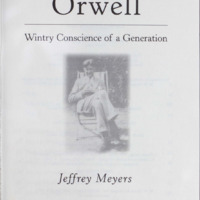-
Title
-
Orwell : wintry conscience of a generation
-
Description
-
Biography of George Orwell by Jeffrey Myers.
-
Identifier
-
910727
-
039304792X
-
Creator
-
Meyers, Jeffrey
-
Format
-
1st ed.
-
Source
-
Brian Lamb Booknotes Collection
-
Gift of Brian Lamb, 2011.
-
Catalog record
-
Language
-
eng
-
Date
-
2000
-
Program air date: March 11, 2001
-
Publisher
-
W.W. Norton & Co.
-
George Mason University. Libraries. Special Collections & Archives
-
Subject
-
"Orwell, George, 1903-1950."
-
"Authors, English--20th century--Biography."
-
"Literature and society--England--History--20th century."
-
"Politics and literature--Great Britain--History--20th century."
-
"Journalists--Great Britain--Biography."
-
Relation
-
Original Booknotes interview
-
Rights
-
This work may be protected by copyright laws and is provided for educational and research purposes only. Any infringing use may be subject to disciplinary action and/or civil or criminal liability as provided by law. If you believe that you are the rights-holder and object to Mason’s use of this image, please contact speccoll@gmu.edu.
-
Text
-
Transcription of Annotations
Notes on front endpapers: "Tues., Jan. 18, 11 a.m. - Jeffrey Meyers taught at Eton. - He had a peculiar relish for personal discomfort - p. 197 - during WWII in London. - Orwell - two approaches to social inequalities - p. 204: 1) Revolutionary - 2) Moralist. - Always a new tyrant ready to take over. - He was a socialist, his ideas were adopted by Labour Gov. in 1945. - V.S. Pritchett called G.O. a saint. - 1941: went to work; BBC experience ended up in '1984'; O. hated propaganda and his job. - Loved his mother / not fond of his father; Jan. 21, 1950 - died; 6 ft. 2 1/2", 1938: weighed 159 [lbs.]; Eton. - 1935: met Eileen O'Shaughnessy - p. 120; work in Hampstead bookstore, marries June 9, 1936. - Orwell's 'Road to Wigan Pier' is a road to nowhere, a dead end; an economic disaster - p. 132: high point of G.O. belief in socialist revolution. - 'Animal farm' - Aug. 1945; p. 248: preface of book; 20 American publishers turned it down. - Death of Eileen, adoption of Richard; he had TB. - '1984': Winston Smith represents Orwell, p. 276; creation of book virtually killed Orwell, p. 279. - Burmese police - dropped his clothes on floor so servants could pick up, p. 62; hit with fists - he loathed his job; he eventually opposes capital punishment - saw one hanging in Burma. - Sally Jerome - wouldn't sleep with him, have recently talked to her. Kay Welton - 9 month relationship." -- Notes on half title page: "p. 78: he felt guilty about his family's colonial background; slave owners in Jamaica, exploiters in Burma, opium dealers in India, his snobbish upbringing, his education at Eton; deliberate immersion into filth, indignity of the homelessness. - His most erotic moment with Eleanor Jaques ended up in 4 novels, p. 87. - p. 96: writer he most resembled was D.H. Lawrence: both lived in poverty / fiercely independent and had a crusading spirit. - p. 102: 1st book published in 1933 - I start calling him Geo. Orwell - name of a village near Cambridge. - Orwell had a tendency toward violence; using fists, kicking servants in Burma / using cane with students, p. 110. - Notes on back endpapers: "'1984': race against time because he was dying, p. 274; published June 8, 1949; Winston, Julia, O'Brien. - How many sold? - By 1989 'Animal farm' and '84' sold 40 million, most popular English writer of our time. - Orwell - enemy of capitalism; '1984' phrases: unpersons, double think, thought police, vaporized. - p. 291: accurate predictions about communism and world's future; also prophetic - breakdown of family etc. - Spanish War: 1937 - Barcelona, 1/2 year. - POUM: the Unified Marxist Workers' Party - a cross between anti-Stalinist Communists and Trotskyists; at last Orwell "really believes in socialism". - 3000 British volunteers fought in S.C.W. - half wounded, 300 killed. - Georges Kopp - phony resumé, Orwell's commander; he was O'Brien in '1984'. - May 20, 1937: shot through the throat. - Muggeridge: "proletarian fancy dress", punctilious rolling of his cigarettes. - Most important experience of his life. - You call 'Homage to Catalonia' his finest book. - Received electrical shocks." -- Annotations by Brian Lamb in the margins and underlining of pertinent phrases throughout the book. Examples: p. 166: "Their experience in Spain made both men [Orwell and Kopp] bitterly disillusioned with Communism." - p. 171: "Intellectuals desperately wanted to believe that the Russian Communists were the absolute antithesis of the German Nazis." - p. 177: "'Homage' pub. in 1952 in U.S. - first hand account of Spanish Civil War." - p. 245: ""He forsaw how depressing it would be to defeat Hitler and then find Europe dominated by Stalin." - p. 297: "I believe that totalitarian ideas have taken root in the minds of intellectuals everywhere, and I have tried to draw these ideas out to their logical consequences. The scene of the book ['1984'] is laid in Britain in order to emphasize that the English speaking races are not innately better than anyone else and that totalitarianism, if not fought against, could triumph anywhere."
 910727.pdf
910727.pdf